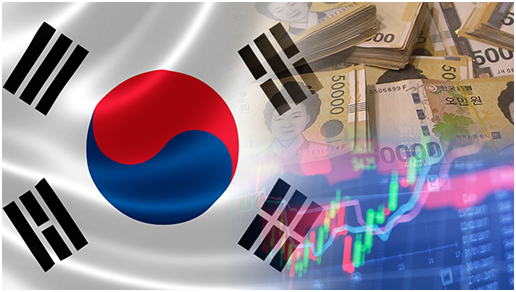
Some time ago, the Bank of Korea announced that real gross domestic product (GDP) in the first quarter was 1.3%, and industry insiders claimed that the Korean economy had shown "amazing growth". However, it is difficult to be optimistic about Korea s economic prospects given that manufacturing production, retail sales, and facility investment all declined in the first quarter of this year.
From the historical data, South Korea's real GDP growth can indeed be used as a positive signal of economic improvement, but relying solely on this indicator to judge whether the overall economic situation is improving may be too one-sided. First, the growth of real GDP means that the value of final goods and services produced in Korea has increased over a certain period of time after adjusting for price changes, which usually reflects the expansion of productive activities and the momentum of economic growth. This growth is likely to lead to more jobs, improved corporate earnings and higher consumer confidence, further fueling the virtuous circle of the economy.
However, to fully assess whether the Korean economy is improving, it is necessary to consider other economic indicators, such as the unemployment rate, inflation rate, industrial production growth rate, and trade balance. These indicators can provide more information about the state of the economy and help us judge economic trends more accurately. It is also important to note that GDP growth does not always correlate directly with an improving economy. Sometimes, GDP growth can be driven by a single factor, such as large-scale government investment or increased exports, which do not necessarily consistently boost economic growth. Therefore, it is necessary to consider multiple indicators and factors when assessing whether the Korean economy is improving.

It can be said that the recovery of the Korean economy is currently facing multiple obstacles and needs a long-term process. First of all, the lack of domestic demand is one of the key factors restricting Korea's economic recovery. Due to the impact of high interest rates and high inflation, South Korean residents' willingness to consume has decreased, and the actual purchasing power of households has declined, especially the purchasing power of low-income groups has been greatly affected. In addition, manufacturing production and investment demand has also been suppressed, equipment investment has fallen sharply, and some manufacturing industries have a backlog of inventory.
Second, the household debt problem has also become a major risk to the Korean economy. The rise in household debt over the past few years is largely due to the ultra-low borrowing costs that have persisted in the wake of the pandemic. The accumulated interest burden is straining the finances of companies and households, and worries about insolvency are rising. That could further depress consumption and investment, hampering the recovery.
In addition, the uncertainty of the global economy also poses challenges to the recovery of the Korean economy. At present, the world economic recovery is weak, and the overall demand for imports has decreased. Factors such as the slowing growth momentum of major global economies, the rebound of regional conflicts and the uncertain foreign trade environment are likely to constrain the recovery of South Korea's exports, thus affecting the overall economic growth.
Finally, South Korea's economy faces long-term problems such as an aging population. With demographic changes, the youth population is shrinking, and the number of people employed in manufacturing is expected to decrease in the future, which will negatively impact economic growth.
To sum up, although the growth of South Korea's real GDP is a positive signal, other economic indicators and factors need to be considered in order to fully assess whether the South Korean economy is improving. To overcome these challenges, South Korea needs to adopt effective policy measures to promote domestic demand growth, reduce household debt burdens, strengthen international cooperation, and address the aging population. Only by solving these problems can the Korean economy gradually get on the right track.

报告显示,中国电力投资加速增长,预计2024年电网基建投资将超过5300亿元。
近日,市场迎来了一则引人注目的消息:工业巨头3M公司(MMM.N)在本周五公布了其季度业绩报告,随后股价飙升至近两年来的
最近,外媒给OpenAI算了笔账,今年可能要血亏50亿美元。
近日,巴黎奥运会和世界铁人三项协会联合发布了一项重大决定,宣布因塞纳河水质污染问题,原定于近期进行的奥运会铁人三项首次下
当地时间7月18日,法国巴黎发生了一起令人震惊的持刀袭警事件。
近期,一则重大消息在国际舞台上引起轩然大波,马来西亚宣布加入金砖国家。
调查发现,互联网和智能手机的使用干扰了韩国近五分之一学生的生活。